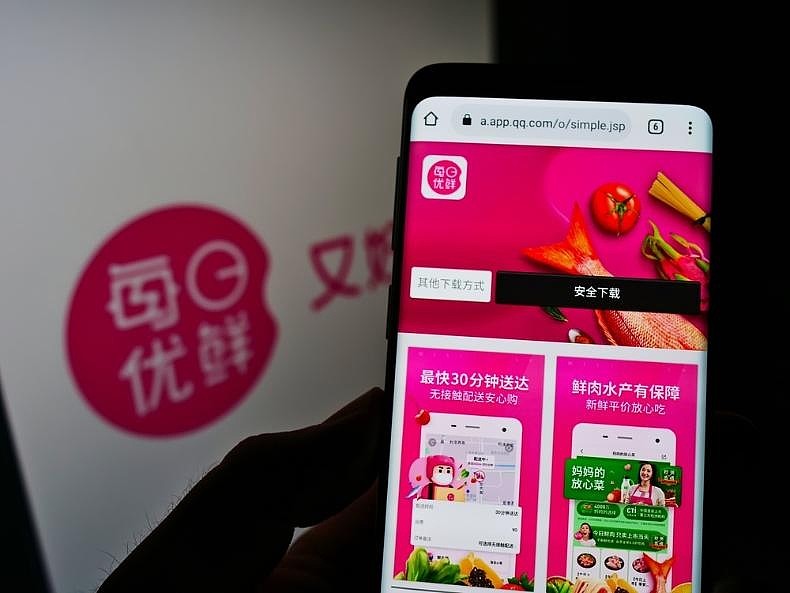
(CapitalWatch, Jan. 31, New York) Against the backdrop of GoPuff's IPO news, Chinese grocery delivery platform Missfresh Ltd. (Nasdaq: MF) steps into the spotlight with its new livestreaming channel on China's TikTok and its innovative distributed mini-warehouse (DMW) model. Monday morning, the stock is sold at $3.10 per share – a bargain, considering the opportunities in the delivery sector that has especially surged under the ongoing pandemic.
The Chinese company delivers necessities and healthy, fresh foods including ready meals and farm products directly to the consumers' homes. In an October report , CW highlighted the similarities and differences between the business models of Missfresh and GoPuff. Specifically, Missfresh focuses on providing a wide selection of fresh grocery items with a focus on more premium users – and has pioneered the DMW model, according to the company. The DMW model involves setting up a network of technology-powered mini-warehouses supplied with quality control checks to provide neighborhoods with high-frequency, convenient, time-saving grocery delivery service.
The year 2021 was breakthrough for Missfresh, as it completed its initial public offering in New York, raising nearly $250 million. As CFO Catherine Chen said at the time, the company's "listing on the Nasdaq further reinforces our brand name recognition and influence in the industry." Missfresh used the majority of the IPO capital to boost its on-demand DMW retail business.
These days, GoPuff is said to be valued at up to $40 billion after its December 2021 funding round involving Guggenheim Partners. Some media have even called the grocery delivery platform a threat to Amazon (Nasdaq: AMZN). And like the U.S.-based GoPuff, Missfresh saw its business surge during the lockdowns of the Covid-19 pandemic. Consumers continue to rely on delivery platforms and are increasingly accustomed to ordering groceries online – and companies strive to deliver faster and better in the wildly growing market.
Today, Missfresh boasts of delivering orders at an average of 36 minutes. The company was able to achieve such quick results after it took control of the supply chain, set up mini-warehouses, and expanded its geographical reach. The company also highlights its continuous drive to stay ahead on technology, deliver premium quality goods, and focus on the customer needs and shopping experience. Now, with an established presence in China's first- and second-tier cities, Missfresh continues to expand geographically and listen to the consumer, constantly upgrading its options.
Last week, Missfresh announced a partnership with Douyin, the Chinese version of the popular social app TikTok. The partnership will allow Missfresh to grow its business through livestreaming. In its statement on Thursday, Missfresh said it will offer more private-label products to consumers on Douyin "to broaden its customer reach and elevate its user experience."
The chief financial officer of Missfresh, Catherine Chen, said, "As a point of difference from most typical live e-commerce models where orders are delivered from their original production locations or remote warehouse in two to three days, Missfresh's livestream retailing initiative is integrated with our DMWs that are strategically located in local neighborhoods in first- and second-tier cities and are equipped with cold-chain warehousing and last-mile logistics capabilities."
In China's grocery delivery market, Missfresh has rivaled Dingdong Ltd. (NYSE: DDL) and JD-backed Dada Nexus Ltd. (Nasdaq: DADA), all racing to provide the fastest service. In April 2021, the competition eased as Missfresh began selling certain products through JDDJ, Dada's on-demand retail platform, in a strategic partnership. In a short time, the company saw its sales on JDDJ surge: eight months after they announced the partnership, Missfresh's sale on JDDJ has grown ninefold.
In addition to JDDJ, Missfresh sells through major delivery providers in China, Alibaba-backed ele.me and Meituan (OTC: MPNGF; HKEX: 3690). Missfresh is backed by Chinese tech titan Tencent Holdings (OTC: TCEHY; HKEX: 0700), which indirectly acted as a cornerstone investor at IPO.
Analysts at J.P. Morgan and Citi see the potential of Missfresh. In November, the two banks had initiated MF stock at a "buy." J.P. Morgan issued a $5.70 per share target on Missfresh, while Citi gave it a $7.08 per share target, representing a significant upside to the stock.
"We believe mini warehouses can have a niche position in China's online grocery market, and local champions can survive in it," wrote J.P. Morgan analysts Andre Chang and Alex Yao. "The company's investments in intelligent fresh market and retail cloud, despite still being at an early stage, offer longterm potential upside, which is not reflected in the current share price."
In turn, Citi noted Missfresh's "high-quality DMW model," as well as intelligent fresh market and retail cloud lines of business, while adding that fierce competition in the space poses a risk.
CapitalWatch Disclaimer
All information contained herein as well as on the CapitalWatch website is obtained from sources believed to be reliable but not guaranteed to be accurate or all-inclusive. All material is for informational purposes only, is only the opinion of CapitalWatch and should not be construed as an offer or solicitation to buy or sell securities. The information includes certain forward-looking statements, which may be affected by unforeseen circumstances and/or certain risks. This report is not without bias. CapitalWatch received remuneration for this report. Please consult an investment professional before investing in anything viewed within.
(Source:Capital Watch)